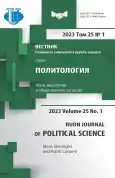Turkish Ideological Influence in Russian Regions: The Turkic Factor
- Authors: Mayorova M.A.1, Sbitneva A.I.1
-
Affiliations:
- The Institute of Scientific Information for Social Sciences of the Russian Academy of Sciences
- Issue: Vol 25, No 1 (2023): Ideas, Ideologies and Public Consent
- Pages: 134-149
- Section: RUSSIA IN A FINE LINE BETWEEN CLEAVAGES AND SOCIAL HARMONY
- URL: https://journal-vniispk.ru/2313-1438/article/view/322248
- DOI: https://doi.org/10.22363/2313-1438-2023-25-1-134-149
- ID: 322248
Cite item
Full Text
Abstract
The article underlines the importance of effective implementation of the state national policy for the stability and sustainability of the state. This issue is particularly relevant in the context of such large ethno-linguistic communities as the Turkic peoples, which are vulnerable to external influence objects. The authors consider the issue of foreign influence on the territorial units of the Russian Federation through economic and humanitarian spheres on the example of the activities of the Republic of Turkey. Within the framework of the ideology of pan-Turkism, the Turkic-speaking peoples, especially those living on the territory of the Russian Federation, are of particular importance to Turkey. Ankara justifies interference in the internal affairs of sovereign states with the idea of building a “Turkic world” under the auspices of Turkey. The article reflects the activities of Turkish organizations, as well as the specifics of economic and humanitarian cooperation in the Republics of Tatarstan, Bashkortostan, Chuvashia, Crimea, Altai, Sakha (Yakutia), Tyva, Khakassia. The analysis of open sources and official data revealed the degree of intensity of the Turkish presence in the Turkic-speaking regions. In the Volga Federal District, the level of Turkish influence as well as cooperation in various fields is quite high, especially in Tatarstan and Bashkortostan. The Republic of Chuvashia remains the least susceptible to Turkish destructive activity. The informational impact through the pro-Turkish media is mainly observed in the Republic of Crimea. In Altai, Tuva and Khakassia, after 2015, the activity of interaction with Turkey in the humanitarian and economic spheres has decreased to some extent. However, the designation of the factor of external influence and the development of effective measures to counteract it should become one of the most important topics of the new Strategy of the state national policy after 2025.
About the authors
Mariya A. Mayorova
The Institute of Scientific Information for Social Sciences of the Russian Academy of Sciences
Email: alex1996m5@inbox.ru
ORCID iD: 0000-0003-0751-5210
Junior Researcher of the Department of Middle and Post-Soviet East
Moscow, Russian FederationAlina I. Sbitneva
The Institute of Scientific Information for Social Sciences of the Russian Academy of Sciences
Author for correspondence.
Email: a_sbitneva@mail.ru
ORCID iD: 0000-0002-9196-9348
Research Fellow of the Department of Middle and Post-Soviet East
Moscow, Russian FederationReferences
- Dikov, A.B. (2016). Regional presidency and institutions of separatism in the Turkic republics of Russia: the modern stage. Bulletin of the Moscow State Regional University. Series: History and Political Sciences, 4, 101–112. https://doi.org/10.18384/2310-676X-2016-4-101-112 (In Russian).
- Nadein-Rayevsky, V.A. (2017). Pan-Turkism: ideology, history, politics. Expansionist doctrine: from the Ottoman Empire to the present day and the fate of Turkey, Russia and Armenia. Moscow: Russkaya Panorama publ. (In Russian).
- Özoğlu, M., Gür, B.S., & Coşkun, İ. (2015). Factors influencing international students’ choice to study in Turkey and challenges they experience in Turkey. Research in Comparative & International Education, 10(2), 223–237. https://doi.org/10.1177/1745499915571718
- Sukhorukov, A.N. (2019). The Sufi Order “Mevlevi” in the Crimea in the 14th — 19th centuries. Scientific Bulletin of the Crimea, 2(20), 1–25. (In Russian).
- Tadysheva, N.O., & Yentinov, E.V. (Eds.). (2018). The construction of all–Russian, regional and ethnic identity in the Altai Republic (late XX — early XXI centuries). Gorno-Altaysk: Surazakov Research Institute of Altaic Studies. (In Russian).
- Tsibenko, V.V. (2020). Competition of the national projects in Turkey: the example of the Circassians ant Crimean tatars. Eastern Analytics, 4, 237–248. https://doi.org/10.31696/2227-5568-202004-237-248 (In Russian).
- Zaporozhets, V.M. (2012). On the question of the evolution of the ethnonym “Oguz” into the ethnonym “Turk”. MGIMO Review of International Relations, 3, 188–193. (In Russian).
- Zorin, V.Yu., & Kamenskikh M.S. (2021). Year 2020 in national policy of Russia: results, tasks, challenges in the new decade. Bulletin of Moscow Region State University (e-journal), 2, 38–50. https://doi.org/10.18384/2224-0209-2021-2-1068 (In Russian).
Supplementary files









